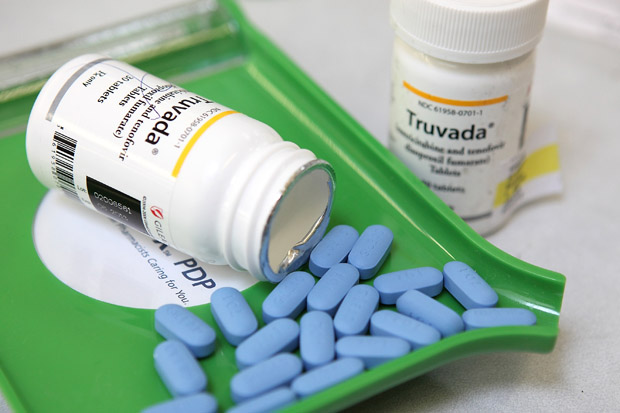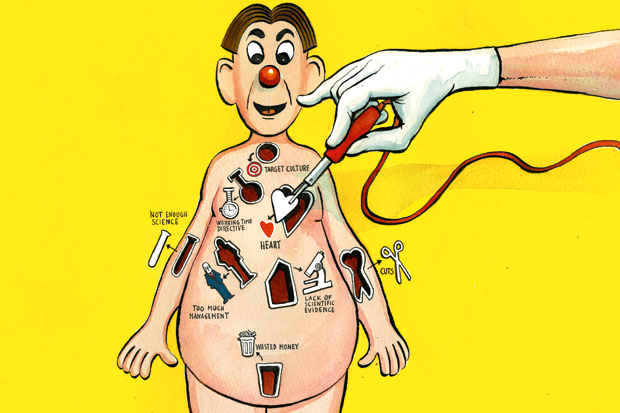You have probably never heard of Truvada, but it is a pharmacological breakthrough that has the potential to consign Aids to the history books. The drug effectively makes its users immune to the HIV virus. In the US, the Food and Drug Administration approved Truvada for use over three years ago. Truvada is even covered by insurance companies. It formed the backbone of New York’s HIV strategy, published this summer, which aims to halt the spread of the infection and reduce new HIV infections to near-zero by 2020.
Yet in this country, a conspiracy of silence surrounds Truvada, or Pre-Exposure Prophylaxis (PrEP), as it is termed. The NHS claims that it is waiting on the results of its own studies to decide whether Truvada should be introduced. So while New York is talking about stopping all new HIV infections in just a few years, on the other side of the pond we are gazing at our navels. Meanwhile, HIV infection rates are actually rising: here, last year over 6,000 people in Britain became newly infected with HIV.
Those in the know in the UK have now resorted to buying Truvada over the internet in order to protect themselves. A year’s worth from India costs about £600. Providing PrEP to high-risk groups is far cheaper than providing medical care to them once they have caught the virus. Yet in spite of the tremendous economic, as well as human, benefits, Britain is avoiding this wonder drug. Why?
The answer is that in our public health system, ideology and sexual puritanism trumps common sense. The NHS and the government refuse to stray from the same tired dogma they have trotted out since the 1980s: use a condom.
What the ideologues can’t accept is that people don’t like using condoms. If they did, there wouldn’t be unwanted pregnancies and HIV rates would plummet. Just stating this self-evident truth is to risk opprobrium from sexual health campaigners and public health officials, who refuse to look at the evidence. Since the HIV epidemic of the 1980s, condom use has been the only form of protection against the virus that we have had. And of course condoms are the best way of protecting against sexually transmitted diseases. But they are only effective if they’re used — and studies suggest that they’re not.
A study of heterosexual men and women found that only about a third used condoms the last time they had sex. Another study conducted in the US found that condoms were used in only one in four sexual encounters. That’s a pretty abysmal take-up rate. For gay men, it’s about 50 per cent.
Yet still the NHS refuses to adopt a more pragmatic approach. The implicit suggestion here is that sex shouldn’t feel good and avoiding HIV must feel like a burden. How dare people take Truvada and simply have sex that they find pleasurable?
Unlike condom use, where each time you fail to use one you risk HIV infection, studies have shown that imperfect compliance with Truvada doesn’t necessarily affect its efficacy — even if you don’t take it all the time, you may still be protected. A groundbreaking study conducted in France even found that taking Truvada immediately before unprotected sex resulted in a ‘very significant reduction in the risk of HIV infection’. The results were so marked that the study was halted and those in the placebo group were switched to Truvada as well.
As an example of the degree of ideological fervour that surrounds this issue, one only has to look at the furore that Bill Gates caused when he tried to address the issue of the low rates of condom use. Two years ago he set up a grant of $100,000 for anyone who came up with a testable hypothesis for a new type of condom that people would actually be happy to use. The grant stated: ‘From the male perspective, condoms decrease pleasure as compared to no condom, creating a trade-off that many men find unacceptable.’ This is not a controversial statement, as many who have used a condom will testify. But when this grant was announced, Gates was denounced by campaigners who said he was appealing to ‘creeps’ and ‘pervs’.
The reason the iron grip of the condom fanatics has been loosened in countries such as the US is down to one simple thing: money. American insurance companies don’t care about an ideological war, they just want to keep their costs down, and it’s much cheaper for everyone to be on Truvada than it is to provide HIV-positive people with healthcare.
Truvada has the potential to be to gay men what the oral contraceptive pill was to women. It is a moment of sexual liberation. We can now pick up the 1970s where we left off, before HIV/Aids cast its long shadow over sexual enjoyment. And it’s not just gay men — as rates of HIV infection are increasing in women, we need strategies to protect them too. Why not put Truvada in a combination pill with the oral contraceptive, so that all women who are not using condoms while on the pill are still protected against HIV?
There is an argument that widespread use of PrEP will result in people stopping using condoms. Firstly, there is not good, reliable data to suggest that this is the case. Studies suggest that those who don’t mind using condoms will use them anyway, and those who do not reliably use them will continue to do so. In other words, behaviours continue, regardless of whether or not the person is taking PrEP. What this means, of course, is that in those who are not reliable condom users, the risk of them contracting HIV could nearly be eliminated. Of course, they would still be exposed to other sexually transmitted infections, but they would have been anyway; and the majority of those, such as chlamydia, are treated relatively easily.
We need to face facts: the battle for condoms has been lost. They weren’t liked and the majority didn’t use them. For combating HIV, there is now an alternative, but our medical establishment is refusing to countenance it. This is madness. It’s not an exaggeration to say that every person who contracts HIV in this country is a victim of a stubborn sexual health policy that refuses to acknowledge this fact. We could eradicate HIV if those in power would just let go of their obsession with the condom.
Got something to add? Join the discussion and comment below.
Get 10 issues for just $10
Subscribe to The Spectator Australia today for the next 10 magazine issues, plus full online access, for just $10.
Dr Max Pemberton is the editor of Spectator Health.
You might disagree with half of it, but you’ll enjoy reading all of it. Try your first month for free, then just $2 a week for the remainder of your first year.
















Comments
Don't miss out
Join the conversation with other Spectator Australia readers. Subscribe to leave a comment.
SUBSCRIBEAlready a subscriber? Log in